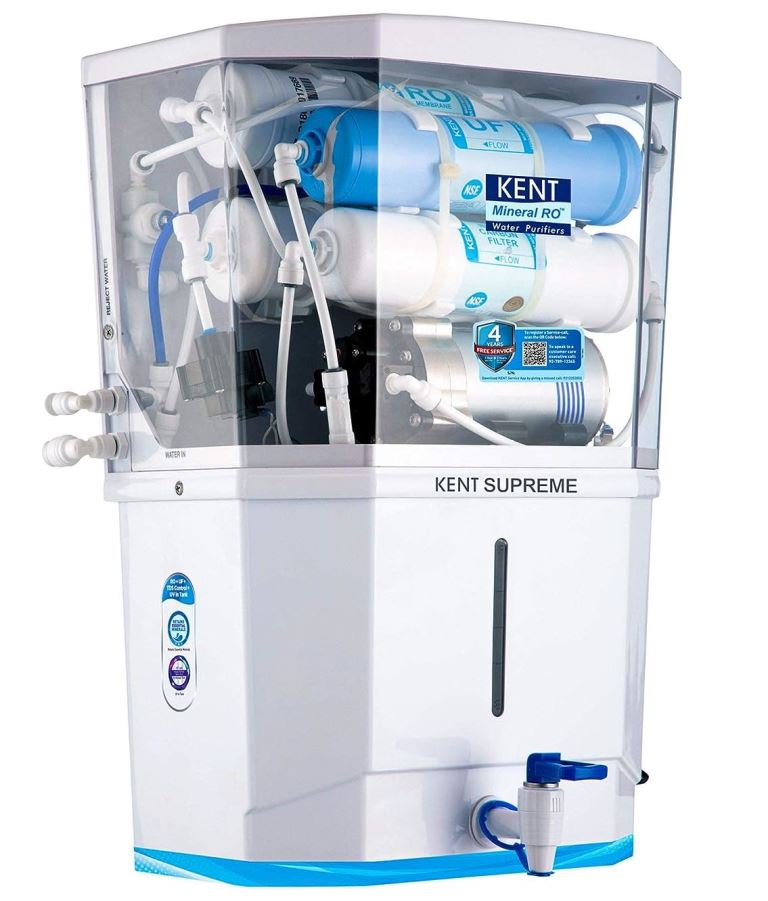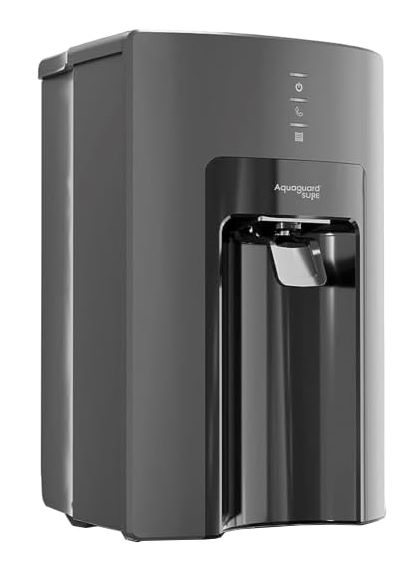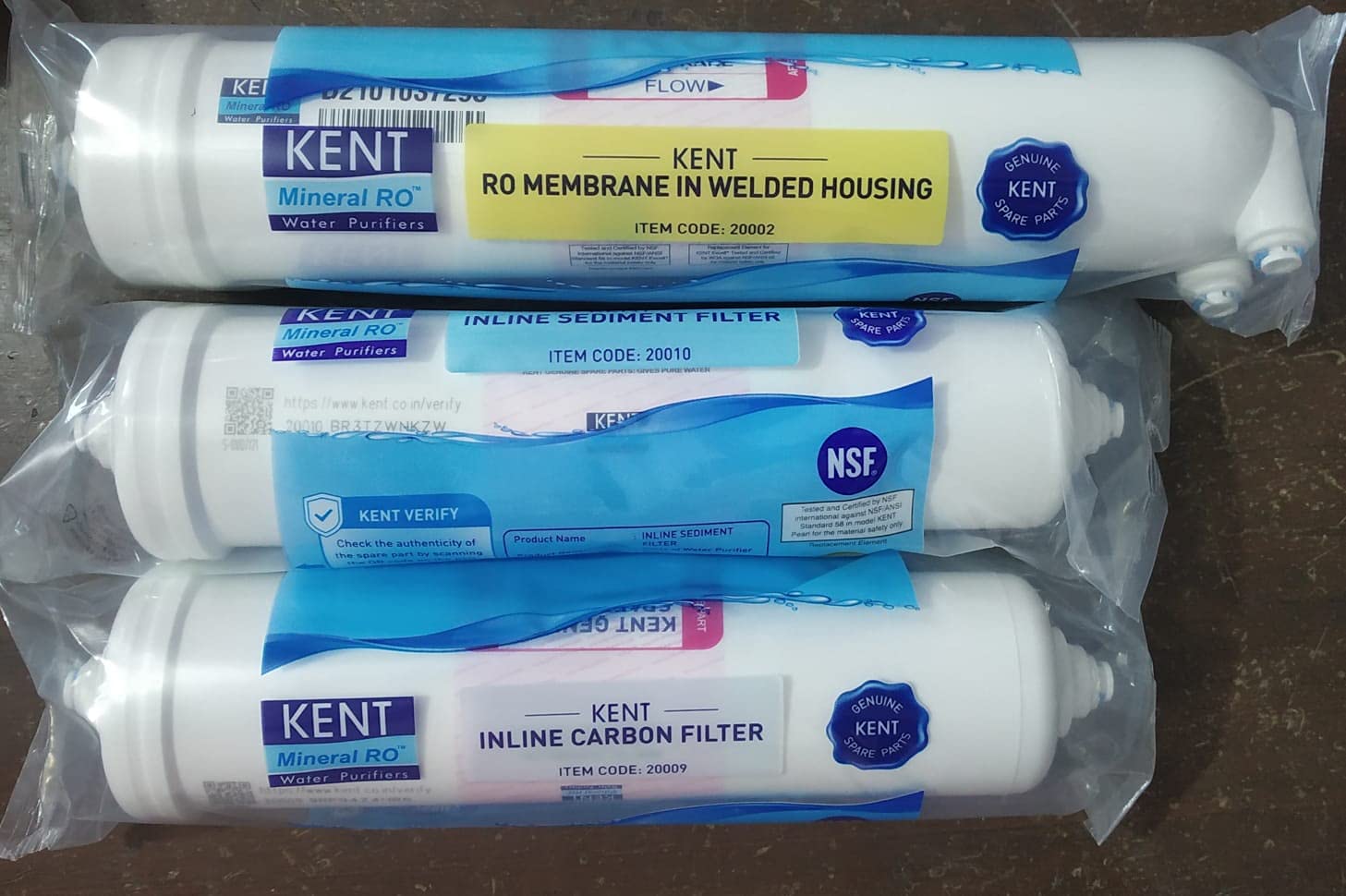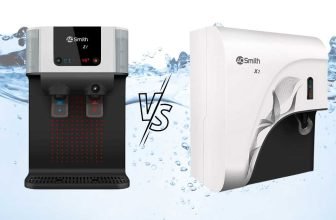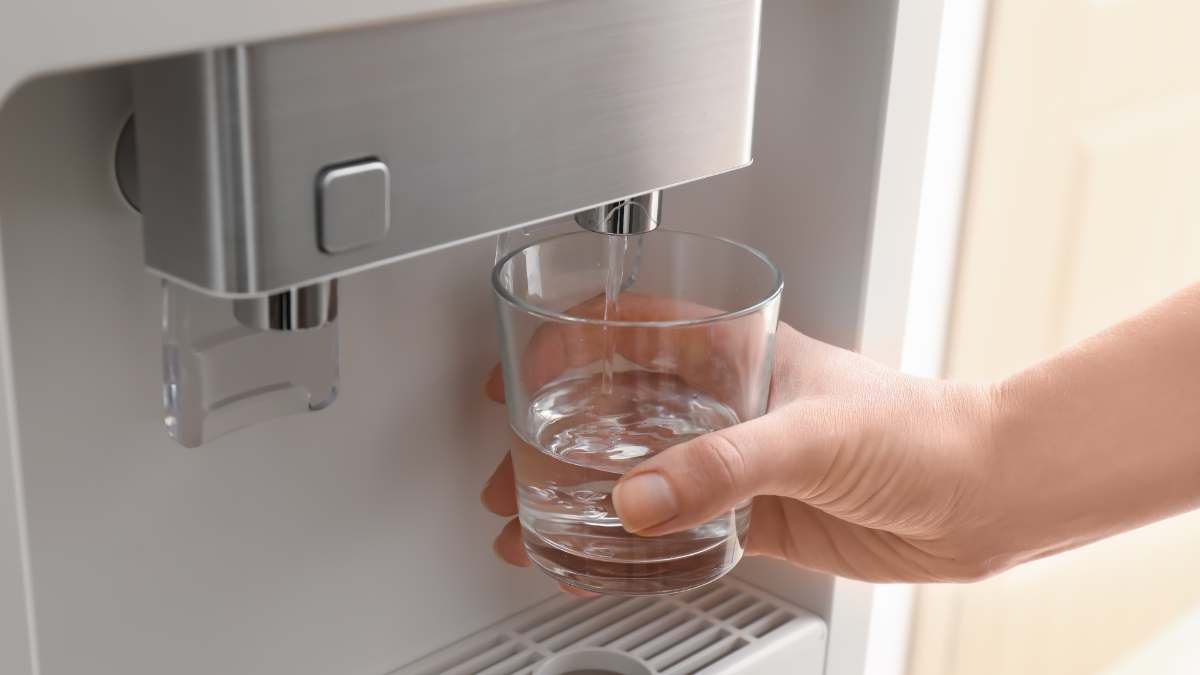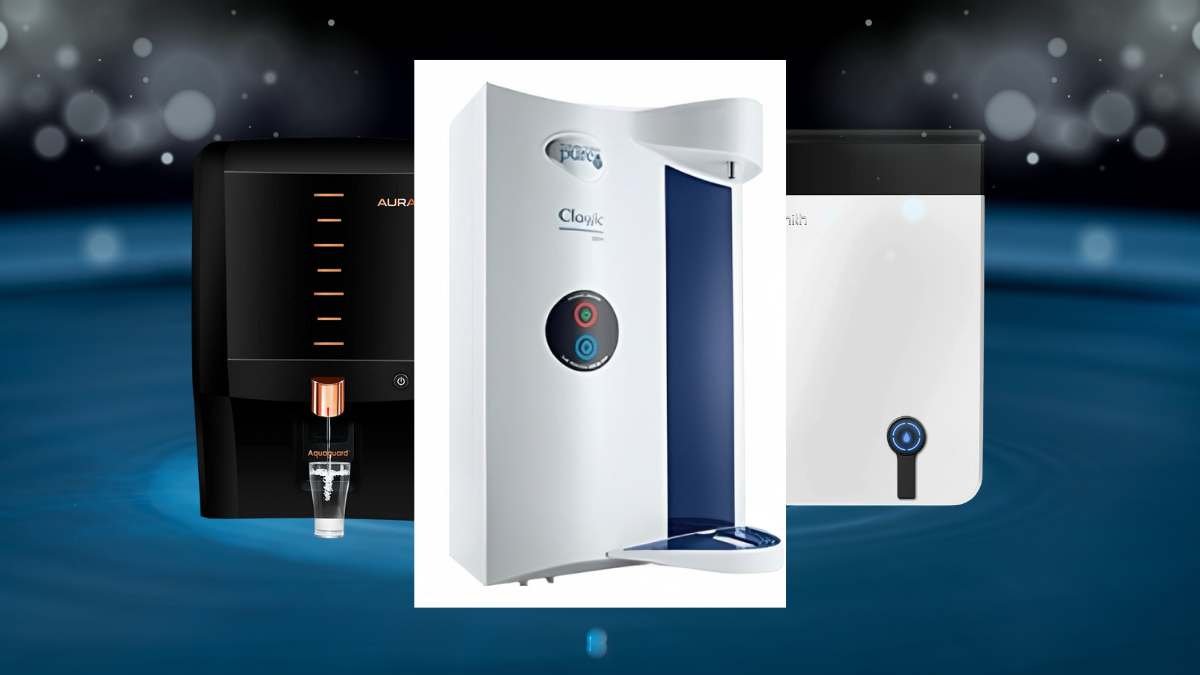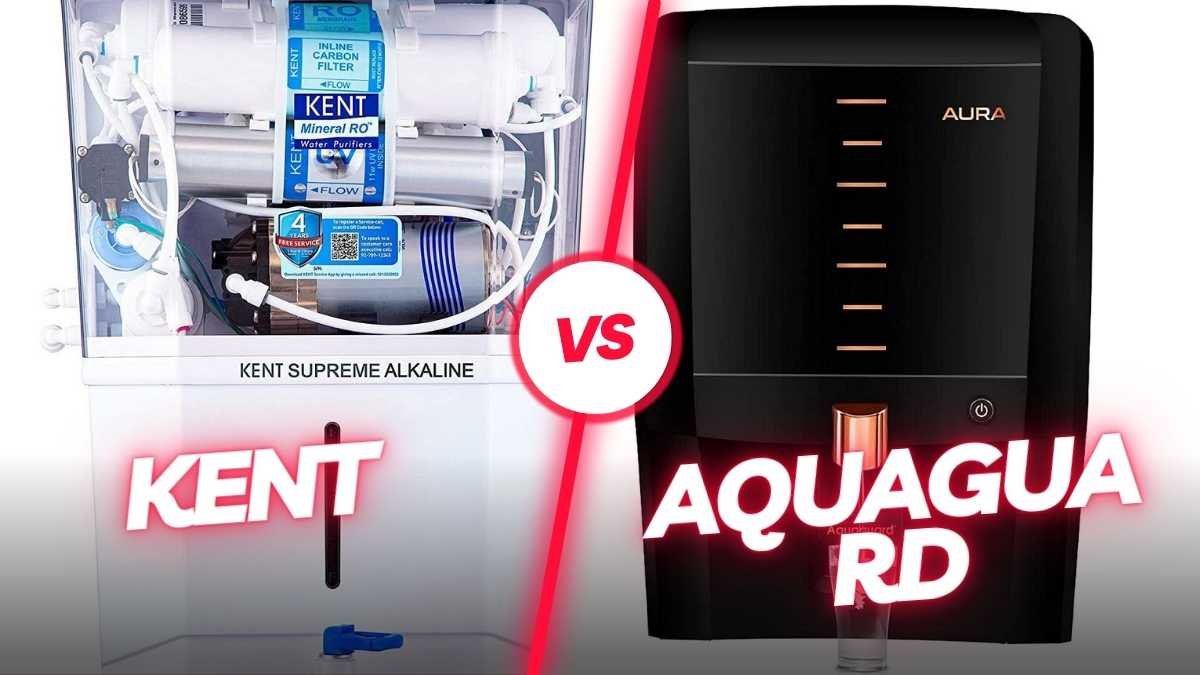
Access to clean, safe drinking water is one of the most important health requirements for families. With rising water pollution across urban India, using a water purifier has become a necessity. RO (Reverse Osmosis) based water purifiers are considered the most effective for thorough purification of drinking water.
However, RO purifiers require periodic maintenance and part replacements which can get expensive in the long run. When buying an RO water purifier, it’s important to consider the long term maintenance costs along with the features and performance.
In this detailed blog post, we compare two of the most popular RO water purifier brands in India – Kent and Aquaguard. We take an in-depth look at the purification technologies used, models, maintenance costs, features, performance and more to help you decide which brand would be better suited for your family.
Overview of RO, UV, UF Purification Technologies
RO stands for Reverse Osmosis and is the primary purification method used in RO water purifiers. It is a multi-stage process that uses pressure to force water through a semi-permeable membrane.
This RO membrane has microscopic pores that block the passage of dissolved salts, minerals, colloids, chemicals, bacteria and other impurities. At the same time, the membrane pores allow water molecules to pass through, giving pure filtered water as output.
UV stands for Ultraviolet and this purification method uses UV radiation to kill disease causing microorganisms in water. The UV light damages the genetic material of bacteria, viruses and other microbes, rendering them inactive.
UF stands for Ultrafiltration and involves passing water through a special UF membrane filter with microscopic pores to remove fine suspended particles, colloids, bacteria, viruses and protozoan cysts.
Most modern RO water purifiers like Kent and Aquaguard combine these three purification technologies – RO, UV and UF to ensure maximum contaminant removal.
Ideal TDS Levels: The effectiveness of water purification can be measured using TDS levels. TDS stands for Total Dissolved Solids and indicates the total concentration of dissolved salts and minerals in water.
For purified drinking water, a TDS level of under 150 ppm is considered good as per WHO standards. Very low TDS water can also taste flat, so adding minerals to reach 50-100 ppm TDS improves taste.
Kent vs Aquaguard – Comparing Popular Models
Kent and Aquaguard offer multiple water purifier models catering to different requirements and budgets. We compare two of their top selling and most feature rich offerings:
Kent Supreme – Kent’s leading model with RO+UV+UF, suitable for medium to large households.
Aquaguard Delight NXT – Aquaguard’s premium variant with RO+UV+UF and added mineralisers.
Here is a feature-by-feature comparison between Kent Supreme and Aquaguard Delight NXT:
Summary: The Kent Supreme comes with bigger 8L storage and higher 20L/hr purification capacity. It also has higher electricity consumption of 60W.
The Aquaguard Delight NXT offers useful features like mineral guard, e-boiling, taste enhancer, and claims 25% better water recovery. Both use food-safe plastic bodies and quad-filtration to give 90%+ TDS reduction.
Detailed Breakdown of Maintenance Costs
While the upfront cost of an RO purifier varies from ₹10,000 to ₹25,000, the long term maintenance costs typically exceed the purchase price over 5-7 years of use. Let’s look at the key maintenance cost components for Kent and Aquaguard purifiers.
1. Filter Replacement Costs
RO purifiers use multiple filter stages, and these require periodic replacements. Here are the filter maintenance costs:
- Kent Supreme: The sediment filter needs replacement every 3 months costing ₹400. The pre-carbon block filter at ₹600 lasts for 6 months. The post-carbon filter and membrane need annual replacement at ₹700 and ₹2000 respectively.
- Aquaguard Delight: The Aquamineral filter requires replacement every 6 months at ₹600 followed by the Chemi Block every 6 months at ₹800. The RO membrane needs replacing every 2 years for ₹3000.
Aquaguard’s membrane has 2X lifespan but costs 50% more than Kent’s. The pre-filters on Aquaguard are also more expensive.
2. RO Membrane Replacement
The RO membrane is the heart of the purifying system but has a limited lifespan. Here is the comparison:
- Kent: Their RO membranes need replacement after 1 year priced at ₹2000.
- Aquaguard: The RO membrane lasts for 2 years before needing replacement at ₹3000.
Aquaguard offers double the membrane life though the cost is also higher. With proper use and maintenance, RO membranes may last longer than specified.
3. Service Charges
RO purifiers need annual servicing which brands charge for:
- Kent: They recommend 2 mandatory services per year costing ₹700 per visit. So ₹1400 yearly.
- Aquaguard: Requires just 1 yearly service costing ₹700 per visit.
Kent has lower service call charges but requires more frequent yearly services.
4. Electricity Costs
RO purification process consumes electricity, adding to costs:
- Kent: 60 Watts power consumption
- Aquaguard: 40 Watts power consumption
Taking 7 Rupees/unit cost and 5 hour daily usage:
- Kent’s yearly electricity cost = ₹756
- Aquaguard’s yearly electricity cost = ₹504
Kent consumes 1.5X more electricity than Kent increasing the running costs.
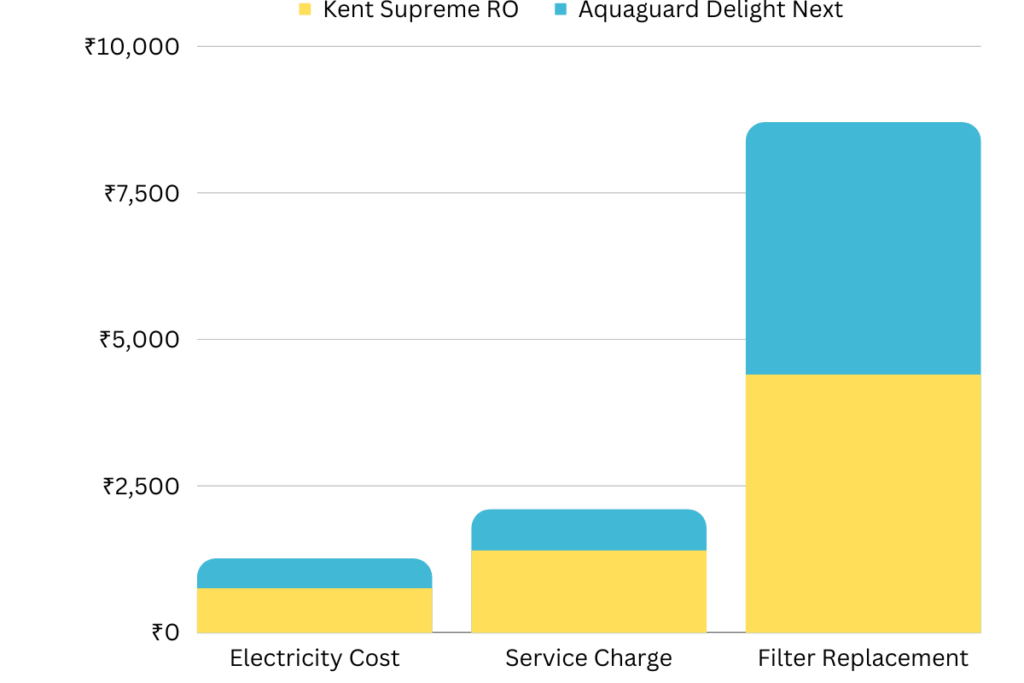
Disclaimer: Approx Annual Maintenance cost of Kent Supreme RO Vs Aquaguard Delight Next
Factors Influencing RO Water Purifier Maintenance Costs
The maintenance costs of an RO water purifier can vary based on several factors:
1. Water Source and Quality
RO purifiers fed by well water require more frequent filter replacements as groundwater contains more TDS, sediments and hardness. Municipal tap water needs less maintenance in comparison.
2. Water Usage and Family Size
Higher daily water consumption by larger families shortens the lifespan of filters/membranes needing faster replacements.
3. Water Hardness and TDS Levels
Hard water causes scaling on the RO membrane surface that can clog pores and passages. It has to be changed quicker.
High TDS in input water also chokes filters faster. In such cases, adding a water softener helps to reduce scale formation and costs.
4. Frequency of Use
RO purifiers used multiple times a day have faster part wear versus occasional use. Frequent power cycles also impact lifespan.
5. Proper Use and Care
Regular cleaning, maintaining no water stagnation, replacing filters on schedule – all this helps optimize lifespan of membranes and filters.
Following manufacturer guidelines is important. Shutting off purifier when not in use avoids needless wear.
6. Service Contracts
AMCs or Annual Maintenance Contracts for RO purifiers typically cover filters, membranes and service visits for an annual fee. This helps cut down maintenance costs.
The Pros and Cons of Choosing Kent vs Aquaguard
Beyond just the maintenance costs, there are several pros and cons to consider when choosing between the Kent and Aquaguard water purifiers:
Kent Supreme RO Water Purifier
Pros
- Lower filter replacement cost
- Cheaper membrane cost
- Higher water recovery rate
- Lower electricity consumption
- Lower per visit service charges
- Value for money pricing
Cons
- Yearly RO membrane replacement
- No mineral addition
- No taste enhancement
- More service visits required
Aquaguard Delight NXT RO Purifier
Pros
- Longer membrane life (2 years)
- Mineral guard for healthy minerals
- Taste enhancer for better taste
- Higher purified water recovery
- Modern and aesthetic design
- Easy to use controls
Cons
- Expensive pre-filter replacements
- High electricity consumption
- Costly yearly service charges
- 2 year warranty but AMC not included
Additional Pros and Cons:
- Kent has faster flow rate, ideal for large families
- Aquaguard has child lock for safely
- Kent has on/off water level indicator
- Aquaguard has low 1-year warranty on entire purifier
- Kent has see-through purifier body
- Aquaguard has automated operations and self-diagnosis
Summary
Kent offers better value with lower maintenance and operating costs. Aquaguard provides more features, modern design and a longer-lasting membrane.
Depending on individual priorities regarding budget, features and performance – one can weigh the key pros and cons of Kent and Aquaguard while choosing the right RO purifier.
Also, read,

